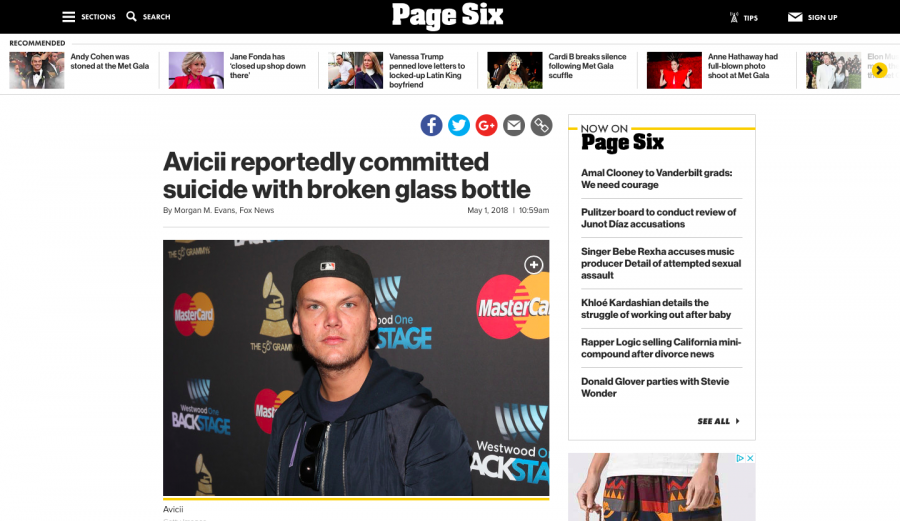Media Reporting of Suicide Increases Suicide Rates
After Avicii’s tragic death last April, his family chose not to release the cause of death right away in order to give them more privacy in their grief. Their publicist’s initial statement read, “It is with profound sorrow that we announce the loss of Tim Bergling, also known as Avicii. He was found dead in Muscat, Oman, this Friday afternoon local time, April 20th. The family is devastated and we ask everyone to please respect their need for privacy in this difficult time. No further statements will be given.”
Word leaked that the cause of death was suicide, headlines like “Avicii’s Cause Of Death Revealed: DJ Cut Himself With Broken Glass” from MSN, emerged. This particular article went on to state, “…the DJ took his life with a piece of broken glass which caused heavy bleeding and which further resulted in his demise.” Another headline read, “So You Want to Know the Real Cause of Avicii’s Death?”
What the vast majority of articles on his death failed to mention was that Avicii was in immense pain due to pancreatitis, and his suicide was described by his family as the following: “He could not go on any longer. He wanted to find peace.” The sources focus only on the details that pique reader interest. Many media outlets took phrases out of context from the family’s statement in order to better fit the narrative they wanted to create.
When asked if she had seen these types of headlines about Avicii’s death or other tragedies, junior Sara Bahri said, “Yeah, it’s devastating because the headlines draw everyone to click on it, but then it’s just a bunch of made-up theories.”
The way the suicide is presented in many headlines implies that Avicii was depressed and could not take life as a celebrity, which may or may not be true. In some articles, “struggled” alone is quoted and used to indicate information that the family never said explicitly. It appears that modern media outlets have abandoned journalistic integrity–and basic human decency altogether–in favor of “click-bait” headlines that drive traffic to their advertising, but at what cost?
According to a study in the Journal of Epidemiology and Community Health, “the greater the amount of coverage of suicide in the media, the greater the increase in suicide rate.” It’s that simple: sensational over-reporting of suicide that has been brought on by ad-based media platform monetization is leading to the tragic deaths of thousands. Especially abhorrent is that the victims most vulnerable to so-called “copycat suicide” are the people who idolize celebrities like Avicii the most: youths. Young people are also at a greater risk because they have more exposure to glamorous suicide headlines through social media, which is largely unregulated. And regulations that do exist lack the specificity and diligence of enforcement to prevent this type of reporting.
“Suicide is the tragic result of a troubled person’s psychological issues. It’s what we’re taught in our health classes. There’s simply nothing romantic about it. So, when TV shows, books, movies, or especially the media pander to young people’s emotions, they can start to paint false romance behind a terrible decision and its results,” says graduate Jack Hunter (’18).
Another study says, “The existence of suicide contagion no longer needs to be questioned. We should refocus our research efforts on identifying which particular story components promote contagion under which circumstances and which components are useful for preventive programming.” To translate: The fact that suicide is being spread “contagiously” by the media is not questionable. We need to be determining the specific aspects of the reporting that are doing harm and those that may be useful for prevention.
Avicii’s death was, unfortunately, just one of many celebrity suicides to be glamorized and exploited for the media’s gain. The path that the nation is on inevitably ends in complete and utter desensitization to tragedy, a loss of humanism that I am not willing to watch sitting down.
“I’ve seen the over exaggeration of suicides and other news in general all across social media, mainly on Snapchat. News channels’ sole goal is to gain viewers and an intense, juicy story does just that,” says graduate John Krendel (’18). News channels are publishing alterations of the truth, resulting in ambiguity around the circumstances of suicide, misplaced blame, and essentially gossip in the place of real reporting. “These media outlets fail to address the warning signs or possible preventative measures and propagate the chain of copycats. They don’t do justice to great men like Avicii,” agrees Hunter.
The take-away from all this is thus: As the online industry continues to put integritous news outlets out of business, it is essential that you, as a consumer of news, read sources that are verified and reliable. If the public expectation is real journalism, not sensationalist advertising, then the click-bait industry will follow suit. So please: be safe, be careful, and most of all: read real news!

I began participating in Horizon as a writer in my freshman year, and I was editor for A&E as a sophomore. As editor-in-chief of the website my junior...






















